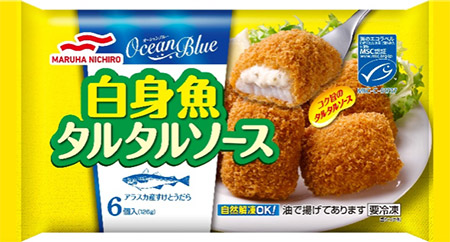Frozen Ocean Blue White Fish & Tartar Sauce CO2 Emissions Cut by 17% with MSC-Certified Alaskan Pollack
Emissions reduced by roughly 17%
March 11, 2024
In August 2023, Maruha Nichiro Corporation (President and CEO: Masaru Ikemi) was selected to participate in the 2023 Model Project for the Carbon Footprint of Products and Services sponsored by the Japanese Ministry of the Environment. As part of the model project, Maruha Nichiro has created a visualization scheme for the CO2 emissions throughout the complete product life of its main product of frozen Ocean Blue White Fish & Tartar Sauce.

The project seeks to create an advanced model for calculating, displaying, and utilizing carbon footprint data to support decarbonization initiatives in Japan and provide consumers with information that will help them select products and services that contribute to realizing a decarbonized society.Maruha Nichiro group has exhibited every year since 2012, and this year will be the 9th time.
A carbon footprint is the total amount of CO2 emitted by a product or service over its complete lifecycle and is calculated from the volume of greenhouse gas (GHG) emissions produced from raw material procurement through to disposal and recycling. Providing visualization of the amount of CO2 emitted throughout the supply chain will make it easier to identify the areas where reduction efforts will be most effectual.
Maruha Nichiro has contributed to the project by quantifying and visualizing the CO2 emissions for one of its most popular frozen products, Ocean Blue White Fish & Tartar Sauce, which is made using MSC-certified (*1) Alaska pollock. Our calculations found that the CO2 emissions over the product’s total lifecycle amounted to the equivalent of 0.93 kg of CO2. The use of Alaska pollock as the main ingredient was found to produce roughly 17% less CO2 emissions compared to using standard walleye pollack. (*2)
This savings in emissions for each product is equivalent to the amount of CO2 one cedar tree absorbs in eight days. (*3)
“Action for climate change” is a materiality of the Maruha Nichiro Group’s Medium-term Management Plan “For the ocean, for life MNV 2024.” We are aiming to reduce CO2 emissions by 30% compared to fiscal year 2017 by fiscal year 2030 and have set a key performance indicator of being completely carbon neutral by fiscal year 2050. The Group is mobilizing an intensive effort to cut its CO2 emissions, including installing solar panels and updating to the highly energy-efficient equipment.
We intend to visualize the carbon footprints of our other core products and actively promote products with environmentally friendly ingredients to provide customers with offerings that contribute to reducing CO2 emissions.
*1 The MSC certification program is operated and managed by the Marine Stewardship Council, an international non-profit organization. The program certifies seafood products harvested from fisheries certified for sustainable practices and for managing with consideration of marine resources and the environment.
*2 Carbon footprint estimates were calculated using company methods with reference to the Carbon Footprint Guidelines of the Ministry of Economy, Trade and Industry and the Ministry of the Environment and ISO 14067:2018.
*3 The amount of CO2 that one cedar tree absorbs in one year is calculated as 8.8 kg-CO2eq. (Source: Prevention of Global Warming webpage on the Ministry of Agriculture, Forestry and Fisheries website)
Contact for media inquiries:
Corporate Branding Department,
Maruha Nichiro Corporation
koho@maruha-nichiro.co.jp

